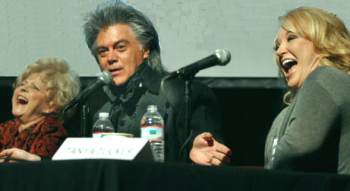|
Her success in the country music industry didn’t translate to the schoolyard, and envious classmates would sing taunts to the tunes of her No. 1 hits. So her father taught her how to box. “Country music was not the most acceptable thing socially to be a part of if you were a kid our age,” said Marty Stuart, who encountered similar problems. Brenda Lee, Tucker and Stuart shared stories Saturday, February 20, during “The Kid’s Got Talent: Child Stardom in the Music Business” at the Country Music Hall of Fame and Museum. Lee, 65, got her start in the country music business when she was 5 years old, then transitioned to rock and pop with hits such as “I’m Sorry” and “Rockin’ Around the Christmas Tree” by the time she was a teenager. Tucker, 51, has charted more than 50 country singles since her career began with “Delta Dawn” when she was just 13. Former Country Music Foundation president and current board member Stuart, 51, left home at 13 to join bluegrass legend Lester Flatt’s post-Flatt & Scruggs band, the Nashville Grass. All three said the path to stardom wasn’t exactly the yellow brick road — success meant sacrifices. For Stuart it meant leaving his family in Mississippi. Tucker said she learned how to drive at an early age to help her father get her to shows. Lee learned how to change clothes in the back of a car and what it meant to provide for her family. “At that early age, I knew I had to contribute to get us out of the predicament that we were in,” said Lee, whose father died when she was 7. “I felt such gratitude to be able to help. “The only bad thing was my siblings lost their mother because she traveled on the road with me, and I regret that.” Stuart’s family relocated to Nashville to be closer to him. To watch or to do Tucker’s father spent his last dollars on her demo tapes and had his Cadillac repossessed. “Do you want to watch TV, or do you want to be on it?” she recalled him asking. Because she was a girl and young, two rarities in country music when her career launched in the ’70s, Bo Tucker told his daughter she had to work twice as hard as other artists. That meant little sleep when balancing school and three shows a night, so she left school. Stuart joked that he became a “road scholar,” taking courses by mail. Lee told listeners Saturday that she was more concerned with what was happening at school than with her career, writing letters to a friend to ask about boys and share her loneliness. During the program, photos of the three stars during their childhoods flashed on a screen. During a black-and-white film of 12-year-old Lee performing, she lip-synced. The stars offered advice to aspiring young artists: Don’t conform to industry standards; do make wise use of your money. They advised parents to give their talented children room to grow. But in the standing-room-only auditorium, there were few children seeking advice. Most of those who attended Saturday’s session were fans seeking a glimpse into the lives of their childhood idols. “It was great and very insightful to learn about their families and how they started out even after listening to them for all these years,” said Millie Salanga, 53, of Smryna. “It is interesting the amount of people it took for each of them to get their big breaks.” Lee, who was inducted into the Country Music Hall of Fame three years ago, will return to the museum on Sunday for a one-hour screening of her appearances on the country music television show Jubilee U.S.A. The events are in conjunction with the museum’s exhibit on Little Miss Dynamite” featuring artifacts, photos and video from her career. By Juanita Cousins |
 Tanya Tucker says she learned two things in her early teens: stage presence and how to fight.
Tanya Tucker says she learned two things in her early teens: stage presence and how to fight.